

![]()
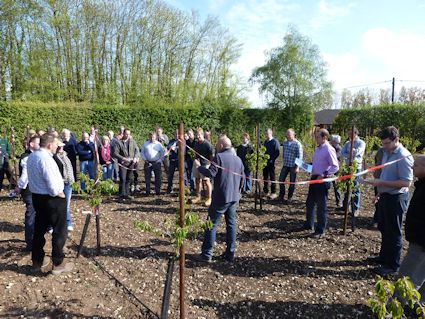 Just a week ago I did something quite unusual; having sworn NOT to watch another edition of The Eurovision Song Contest, I broke a promise and sat through three and a half hours in the hope that Bonnie Tyler would overcome years of disappointment. It was not to be, the only predictable outcome was the annual debacle of 'block voting' by neighbouring Countries.
Just a week ago I did something quite unusual; having sworn NOT to watch another edition of The Eurovision Song Contest, I broke a promise and sat through three and a half hours in the hope that Bonnie Tyler would overcome years of disappointment. It was not to be, the only predictable outcome was the annual debacle of 'block voting' by neighbouring Countries.
Back to the world of fruit.
Last week when FAST members visited Will Riccini at Bekesbourne, a central part of the visit involved the investment in Cherries. Bekesbourne Farm is a 16 hectare unit with a mix of apples, pears and 3.45 hectares of Cherries.
Will and his brother David have invested in new Cherry plantations and protective covering systems. One new plantation is close to a road and near to cottages, so to be sure of not falling foul of planning laws, Will said they applied for planning consent to cover this new plantation. The cost of the planning process alone was £3,500 and this is before a Cherry tree had been planted and a protective tunnel erected.
The appeal of English Cherries is obvious to any one who has eaten them; the cost of producing quality cherries is however very high. In days gone by, in the heyday of cherries grown along the A2 in Kent from Faversham to Sittingbourne on trees around 70ft high the weather determined the success of the crop. A dry cherry harvest would produce a bountiful crop of delicious cherries. A wet season, and little or none would be picked. The cherry growers of old reconciled the fact that cherries cost very little to grow; the cost was all in the harvesting, so no crop, no cost; a good crop; everyone was happy; grower, pickers and consumers!
Today the successful cherry grower must invest heavily to guarantee a good crop of high quality fruit.
The cost of a purchasing and erecting 1 hectare of tunnels is estimated at £27,000 and the cost of trees, stakes, tree ties, guards etc. adds another £19,000.
So to establish one hectare (2.4 acres) of modern cherries is circa £46,000.
That is a lot of punnets of cherries!
Modern cherries are grown on dwarfing rootstocks which have transformed the consistency of achieving regular yields. The Gisela series of rootstocks have been key to this advance.
Tree management is also key to achieving early and regular yields of quality fruit. It is important with any tree; be it apple, pear, plum or cherry that the early tree management settles the tree into a balance between growth and cropping.
Managing the leader is very important; the ideal leader will grow side shoots which will become new cropping units, however cherries can often produce bare wood on the central leader, experience has shown that twisting the leader around the stake restricts the 'upward growth' and encourages side shoots forming.
In the pictures below, the one on the left was planted this winter and has had the leader 'twisted' while the tree on the right was planted in the 2011/2012 winter and is in its 2nd year in the ground. It had the leader shortened back and the young branches (feathers) tipped to encourage shoot formation. It was after observing the growth of the leader during 2012 that the decision to 'twist' the new planting was taken.
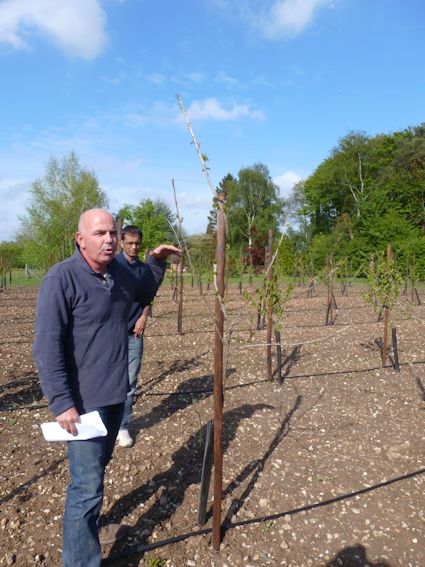
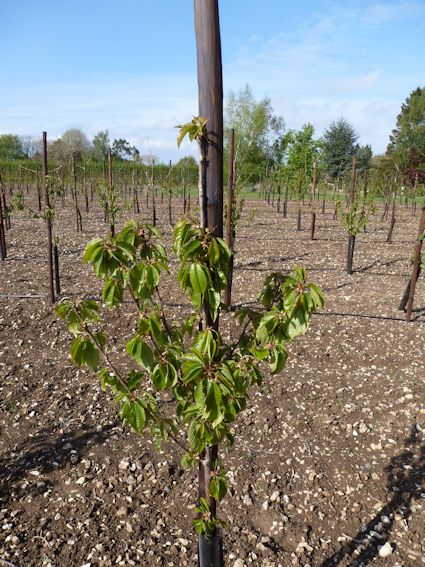
The pictures below are of the variety Penny planted in the 2008/2009 winter.
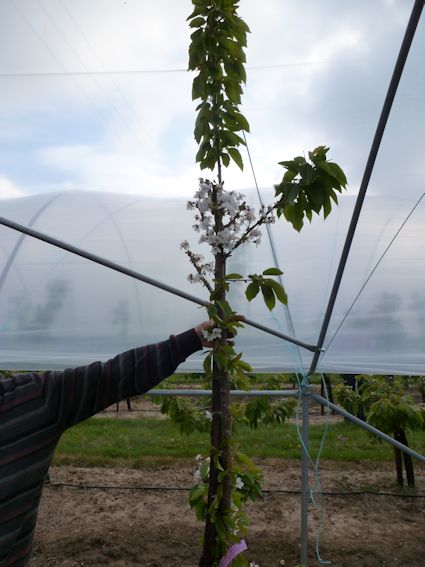
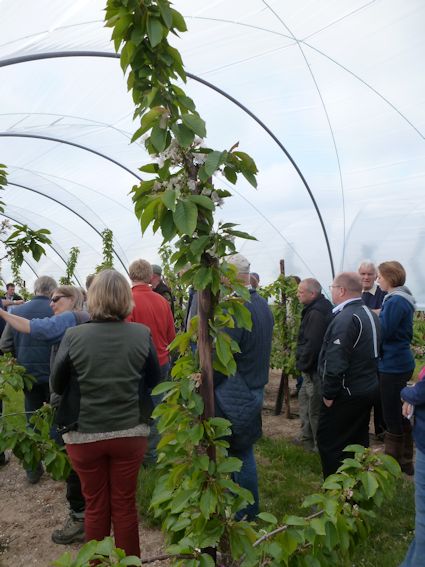
Now in its 5th year these trees are nicely balanced and promise a good crop this summer
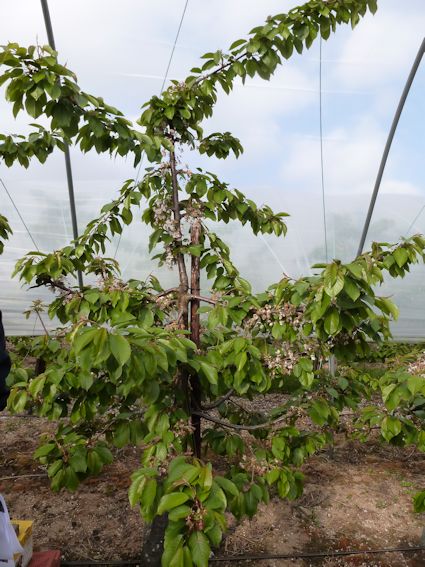
Pollination under tunnels is achieved with these Bumble Bee hives supplied by KOPPERT
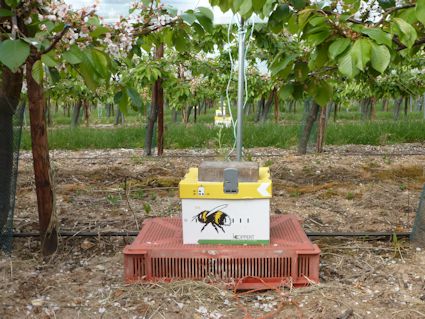
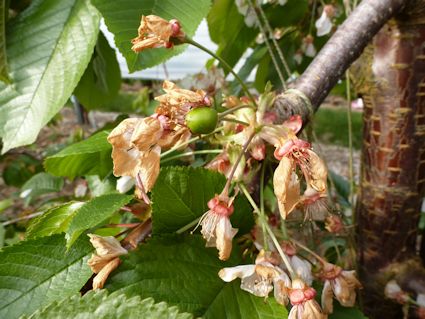
The revitalisation of English Cherries has been consolidated by the emergence of a plethora of new varieties; many bred at Summerlands in Canada, or from The ,Czech Repubic (Kordia) and Germany, with others emerging from Denmark (Regina) and it is estimated more than 140 new cultivars have been released from Europe ans Asia in the last 10 years. One exceptional new variety PENNY was released in 2001 from a breeding programme at East Malling Research.
At Bekesbourne Farm, Kordia, Regina and Karina join Penny in the variety mix.
E&SFGS Farm Walk - 21st May 2013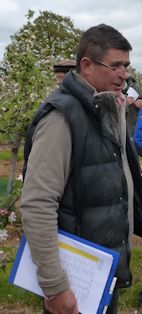
![]() On Tuesday 21st May, The English Apple Man drove to Suffolk for a Blossom Walk organised by The Essex & Suffolk Fruit Growers Society (E&SFGS) at Jeremy Linsell's Farm at Braiseworth.
On Tuesday 21st May, The English Apple Man drove to Suffolk for a Blossom Walk organised by The Essex & Suffolk Fruit Growers Society (E&SFGS) at Jeremy Linsell's Farm at Braiseworth.
Regular English Apple Man readers will be familiar with my support for fruit walls as the system for maximising yield and quality. Jeremey Linsell, while recognising the benefit for increasing yields of 'mainstream' varieties like Gala & Braeburn using the fruit wall system, said he did not believe he could compete with larger scale growers, growing on superior soils.
To be competitive and earn a decent living, Jeremy has maximised the quality performance of his orchards. He made the point that we are often guilty of getting 'hung up' on yield. He prefers to maximise the price x grade-out x yield equation.
Jeremy told us that his involvement in a 'Bench Marking' group opened his eyes to the importance of PRICE which is the single biggest factor in improving his profitability. Of course yield is important, BUT, chasing ever higher yields of precocious cropping varieties like Gala and Braeburn is a risky practice if the price of 'commodity apples' comes under pressure from too much volume on the market.
Jeremy has changed the fortunes of his orchards by concentrating on, 'niche' varieties, high value fruit and club varieties which offer higher retail (and farm gate) prices.
Jeremy said after acquiring the farm in 2002 and with Cox a high percentage of the varieties, he has gradually remodeled the variety portfolio away from high dependence on Cox and concentrated his efforts on producing very good (but not spectacular) yields of varieties with a higher price profile. He inherited two 'niche varieties' Winter Wonder' and 'Suffolk Pink' and back in the winter of 2005/06 became the only grower in East Anglia to plant the Club apple Jazz, a variety that has become THE Club apple, second only to Pink Lady which was the forerunner of Trademarked apples.
Below Suffolk Pink
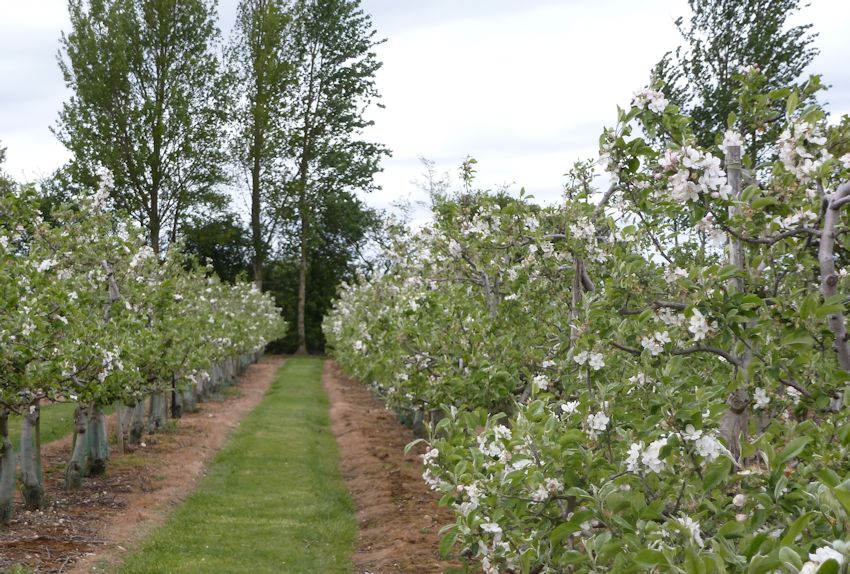
Jazz was bred in New Zealand and is licensed in the UK to Worldwide Fruit, who developed a dedicated grower base of around thirty growers in England.
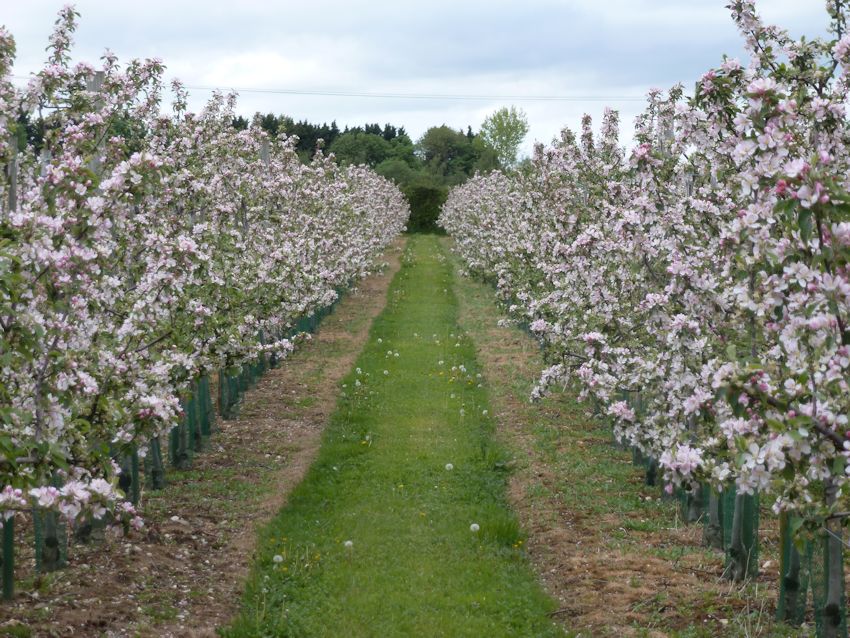
During the winter of 2010/11 Jeremy has also planted ENVY another NZ bred 'Club Apple' destined to be another successful part of the Worldwide Fruit portfolio.
ENVY - a new 'Club Apple' from New Zealand
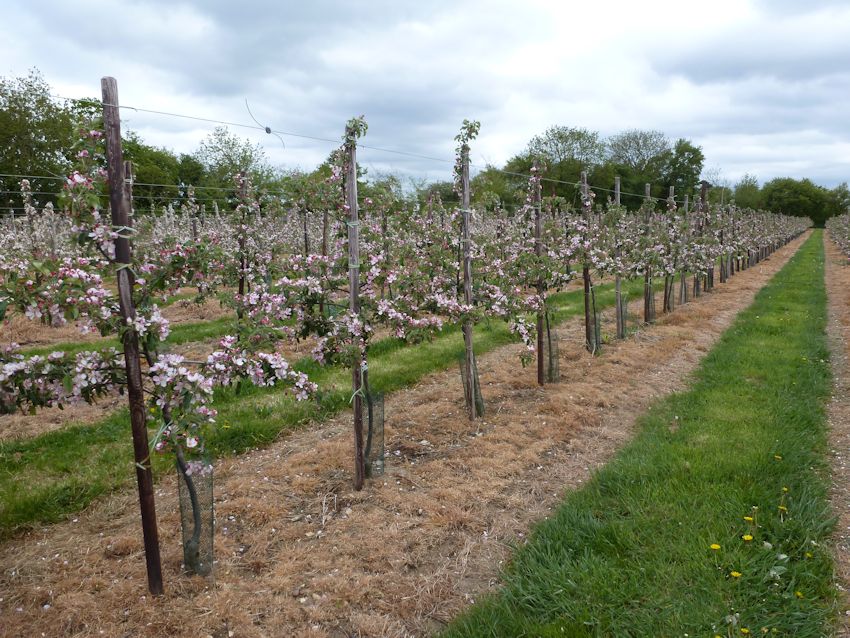
By concentrating on varieties which attract a higher price 'back to the grower' and carrying out a 'ruthless' policy of quality thinning, Jeremy aims to deliver only marketable fruit to the packhouse. A very good example of his success rate, is reflected in the performance of Suffolk Pink last year. The yield per hectare was 30 tonnes and 28.1 tonnes reached the retail shelves of Waitrose; which equates to 94% of the fruit picked. This only happened because any visible sub standard (quality or size) apples were thinned off well before harvest. Additionally, a policy of 'picking over' 5 times at harvest maximised the colour (and value) of each fruit.
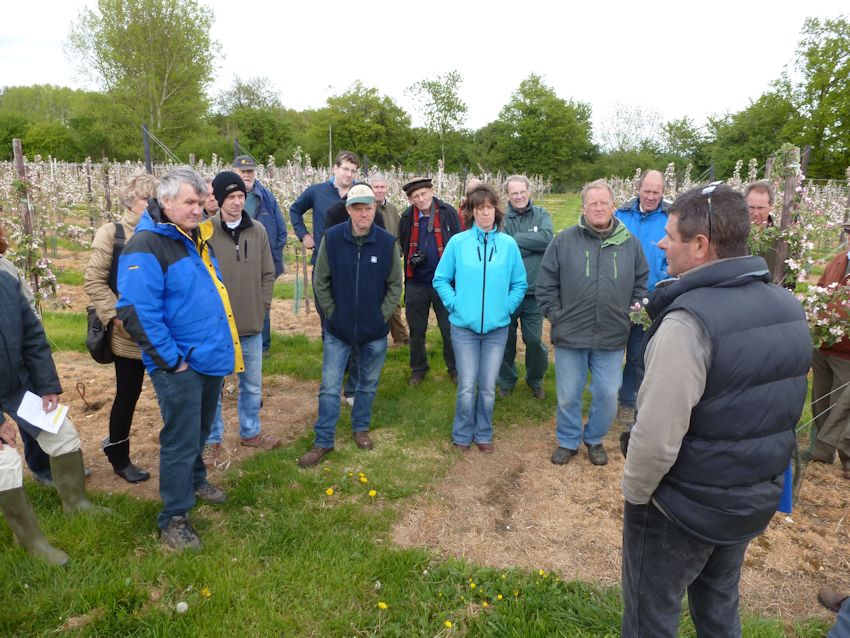
Jeremy Linsell freely admits that his thinning costs and picking costs are high (by comparison to the standard costs of most growers) but by only delivering high quality, and by definition, high value apples into the packhouse, he receives a much more valuable return for each Kilogram sold. His 'mantra' if I invest a penny in, I expect to take 2-3 pennies out!
A very good example of the cost breakdown by % of a kilo of apples,
Growing costs = 22%. Overheads = 7%. Storage & Packing costs = 71%.
This highlights the importance of only sending as near 100% marketable fruit to the packhouse; any fruit which does not reach the Supermarket shelves will have a negative value, which will come off the monetary return 'back to the grower'
COX - as part of the dedicated Grower supply chain, Jeremy sells his Cox Apples as 'Tree Matured' to Waitrose. This requires the apples to be left on the tree until the fruit delivers an enhanced flavour while retaining excellent texture.
Pictured below Cox Lavera, a higher coloured (natural) clone of Cox.
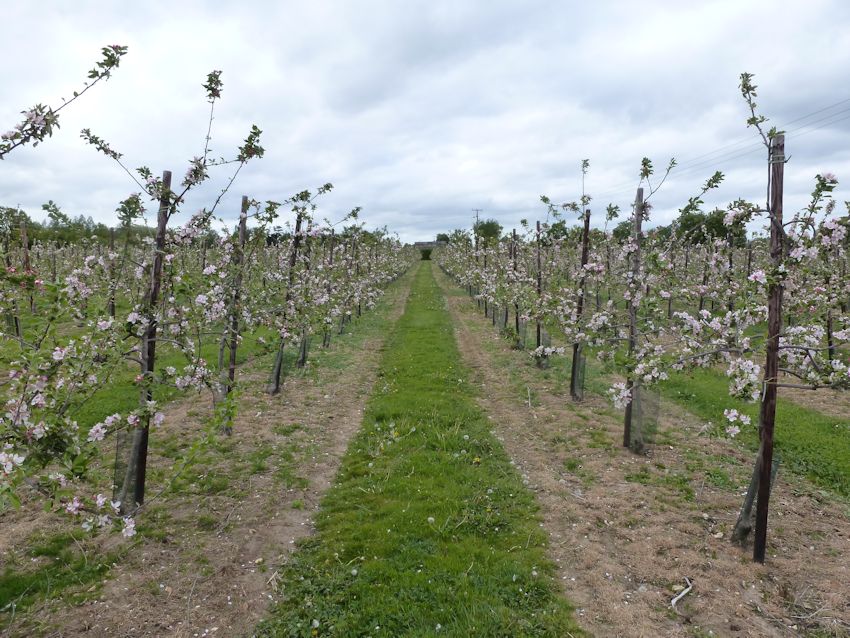
Winter Wonder fits into the same 'niche variety' profile as Suffolk Pink. It yields a similar 30 tonnes per hectare at Braiseworth after thinning.
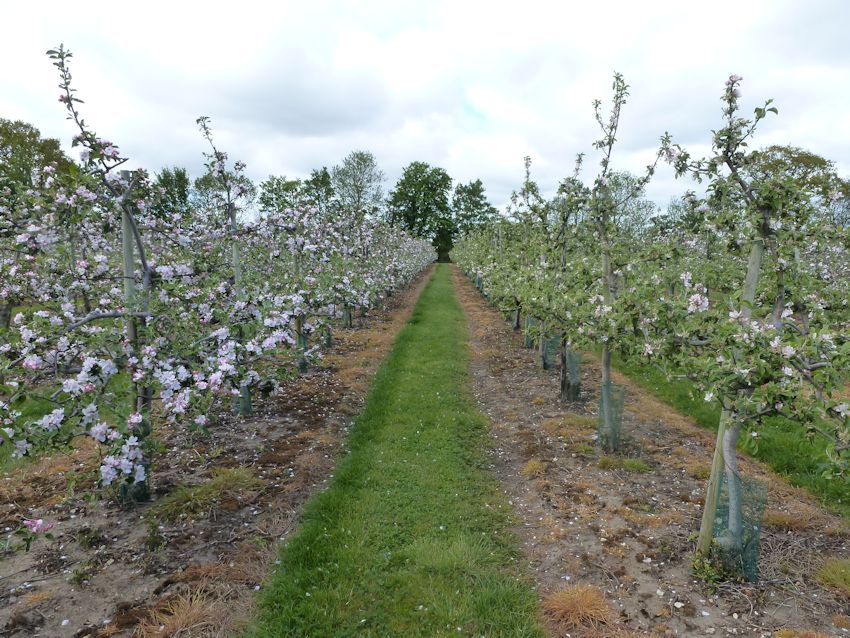
Although Braiseworth is a long way from Kent, Jeremy Linsell said it fits into a similar blossom 'time frame' as West Kent.
BELOW Egremont Russet is the first variety into bloom and fruitlets are clearly showing signs of growth. Suffolk Pink is similar.
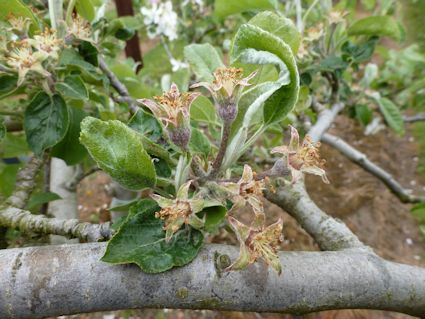
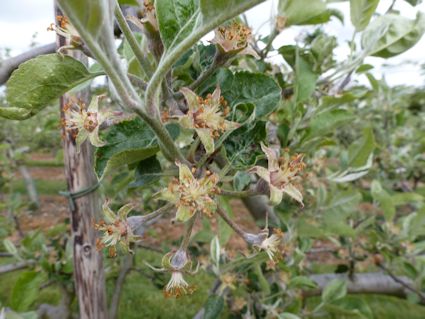
Jeremy Linsell should be proud of his achievements; by his own admission he has suffered some difficult years, particularly the frost damage in 2011. By working very hard; "he is currently the only full time worker on his farm" with thinning and harvesting carried out by workers employed under the Seasonal Agricultural Workers Scheme (SAWS) and maximising the value of every apple, he has developed a sound business with great future.
With New Zealand apples the prime source of apples on our Supermarket shelves this summer, it is interesting to hear the views of the major exporter of New Zealand Organic Apples. While this is an overview of exports to many countries, it is a poignant insight into the export strategy of one of the leading producers of Organic Apples.
May 20th, 2013
New Zealand's leading organic apple exporter says a rise in Washington State Fuji volumes and currency challenges have led to a decline in his country's plantings over the last three years, but diversification has kept business going.
DM Palmer general manager David Brassell told www.freshfruitportal.com the industry was very reliant on Taiwan five years ago, but has moved to new markets and apple types to stay ahead.
"We've been watching the challenge coming and taken two actions - we have less standard grade Fuji with more high color strains planted, which is coming into production now, and we're also diversifying the markets right across the Middle East, South East Asia and the Far East into Japan," he said.
"Demand is particularly strong and the U.S. looks good, Asia's gone very well for us and continental Europe again has opened up pretty well."
He highlighted the Diva variety as one of the high color strains, which is in the market for the first time this year.
On the whole, Brassell cited a fairly positive season to date.
"I think the Royal Gala market has been as strong as any, but Fujis are a little more challenging because of the big Washington State crop which has caused a bit of a bottleneck in Taiwan and also at home in North America.
"Pinks are in good demand, Grannys are in good demand, Braeburn seems to be ticking away although it's still early days for the continent, but the early indications are that there's not a massive crop heading that way and the market is ready to receive it.
He expected DM Palmer to ship 90% of New Zealand's organic export apples this year, while his company also sells conventional apples on behalf of independent growers.
"It's tough and we've been able to survive with economies of scale and the fact that we only grow organic apples as a company.
"We're seeing conventional growers trying to grow some organic but that's been relatively unsuccessful, and regrettably small organic growers are finding it pretty hard to survive; the cost of transitioning into organic now is almost prohibitive.
"Part of the reason we've been able to survive is that we're a diversified business - we grow onions, butternut squash, apples, maize, and in the tough apple years we've been able to survive on other crops. I think to be a monoculture just growing organic apples is a pretty tough game."
He said around 45% of the company's organic apples are shipped to North America, about 15-20% go to Asia and the balance is shipped to the U.K. and continental Europe.
Source - www.freshfruitportal.com
Next Friday The English Apple Man is off on holiday to Malta for two weeks, but the Journal for Friday 31st May, Friday 7th June & Friday 14th June will be published on line as usual; 'albeit with a holiday flavour'
Take care
The English Apple Man